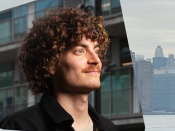Por Rui Vieira da Cunha (MLAG UPorto, Business School UCP).
The alignment problem in artificial intelligence, which concerns the challenge of ensuring that AI systems act in ways that are beneficial to humans, is often approached as a technical hurdle (Russell 2019). However, this paper posits that the true intractability of the problem lies less in its lack of objectivity and more in the dynamic nature of human values, which are continually reshaped by technological advancements (Vallor 2016).
The paper argues that as technology becomes deeply embedded in our lives, it not only serves as a tool but also actively shapes our understanding of the world and, consequently, our values. This fluidity of values in the face of technological change makes the static alignment of AI to a particular set of values a Sisyphean task (Bostrom 2014). In this regard, the views of Ian Hacking (1999) on the looping effects of human kinds can be used in the context of AI and technology, where the categorizations and understandings propagated by these systems can lead to a recursive effect on human self-conception and values.
Moreover, the insights of John Danaher on the process of techno-moral change underscore the fluidity and evolutionary nature of morality in the face of technological progress (Danaher&Skaug Saetra 2022).
A further and most relevant theoretical guide of the paper is the concept of transformative change, as introduced by L.A. Paul (2014). Paul’s exploration of life-altering decisions, where the very act of undergoing an experience can change one’s preferences and values, mirrors the challenges we face with AI and the possibility that they induce transformative changes in individuals and societies (Harari 2015), leading to shifts in values that are unpredictable and challenging to align with. Recognizing the intertwined nature of technology, values, and transformative experiences is crucial for understanding the profound challenges of the AI alignment problem (Floridi 2013).
Bostrom, Nick. Superintelligence: Paths, Dangers, Strategies. Oxford: Oxford University Press, 2014.
Danaher, J., and H. Sætra. “Mechanisms of Techno-Moral Change: A Taxonomy and Overview.” Ethical Theory and Moral Practice 2023.
Floridi, Luciano. The Ethics of Information. Oxford: Oxford University Press, 2013.
Hacking, Ian. The Social Construction of What? Cambridge, MA: Harvard University Press, 1999.
Harari, Yuval Noah. Homo Deus: A Brief History of Tomorrow. New York: Harper, 2015.
Paul, L.A. Transformative Experience. Oxford: Oxford University Press, 2014.
Russell, Stuart. Human Compatible: Artificial Intelligence and the Problem of Control. New York: Viking, 2019.
Vallor, Shannon. Technology and the Virtues: A Philosophical Guide to a Future Worth Wanting. Oxford: Oxford University Press, 2016.


















